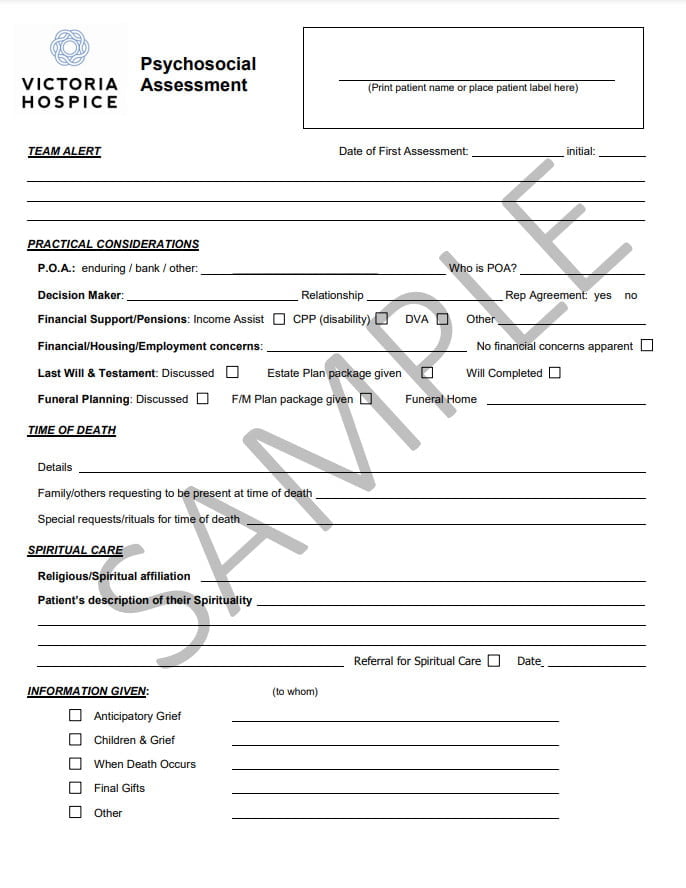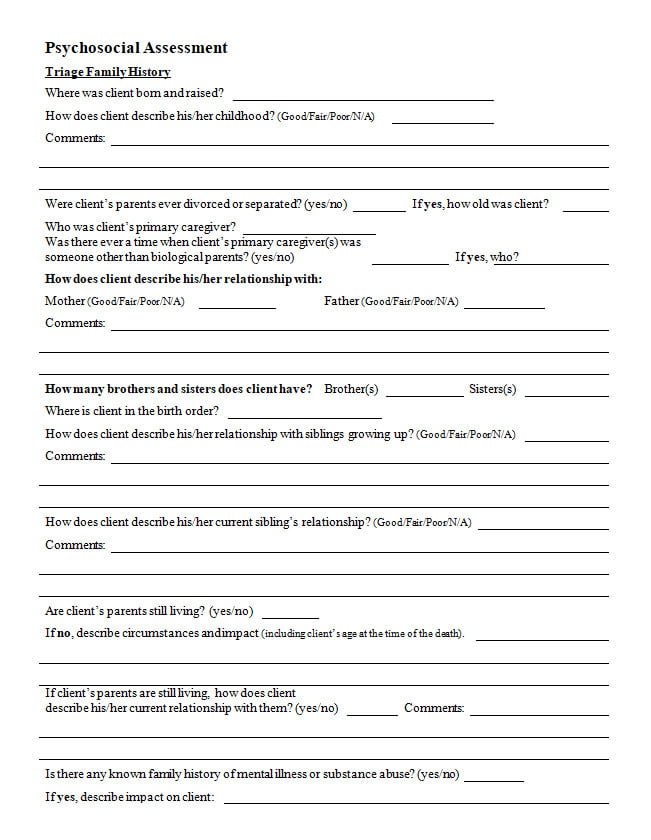
A psychosocial assessment is a comprehensive evaluation of an individual’s mental, emotional, and social well-being. It involves gathering information about a person’s psychological functioning, social environment, and overall mental health. The assessment aims to provide a holistic understanding of the individual’s strengths, challenges, and needs, which can guide treatment planning and intervention.
A psychosocial assessment typically involves a series of interviews, questionnaires, and observations conducted by a qualified mental health professional, such as a psychologist, psychiatrist, or social worker. It explores various aspects of the person’s life, including their family and social relationships, educational and occupational history, cultural background, and personal experiences. By gaining a deeper understanding of these factors, mental health professionals can develop a more comprehensive and individualized treatment plan.


Why is Psychosocial Assessment Important?
Psychosocial assessment plays a crucial role in understanding mental health because it provides a comprehensive view of an individual’s life circumstances and experiences that may impact their well-being. It goes beyond diagnosing specific mental health disorders and explores the various social, emotional, and environmental factors that contribute to a person’s mental health.
Here are some key reasons:
- Identifying underlying issues: A psychosocial assessment helps uncover underlying issues that may be contributing to a person’s mental health challenges. It helps mental health professionals understand the individual’s unique circumstances and experiences that may be influencing their mental well-being.
- Informing treatment planning: By gaining a comprehensive understanding of an individual’s psychosocial factors, mental health professionals can develop more effective treatment plans. The assessment provides valuable information that can guide the selection of appropriate interventions, therapies, and support services.
- Assessing risk and safety: Psychosocial assessment helps identify potential risks and safety concerns, such as self-harm or harm to others. It allows mental health professionals to assess the level of risk and develop appropriate safety plans to ensure the individual’s well-being.
- Monitoring progress: Psychosocial assessment is not a one-time evaluation but an ongoing process. It allows mental health professionals to monitor an individual’s progress over time, making adjustments to the treatment plan as needed.
- Providing a holistic approach: Mental health is influenced by a variety of factors, including biological, psychological, and social factors. Psychosocial assessment takes into account the broader context of an individual’s life, providing a more holistic understanding of their mental health.




How is a Psychosocial Assessment Conducted?
A psychosocial assessment typically involves a series of steps and components. Here is an overview of the main components of a psychosocial assessment:
1. Initial interview:
The assessment process usually begins with an initial interview, where the mental health professional gathers basic information about the individual, such as their details, reason for seeking assessment, and any relevant background information.
2. History taking:
The mental health professional will gather information about the individual’s personal and family history, including any significant life events, medical history, and past mental health issues. This helps in understanding the person’s unique background and potential risk factors.
3. Presenting problems:
The individual is encouraged to discuss their current concerns, symptoms, and challenges. This helps in identifying the specific issues that need to be addressed in the treatment plan.
4. Social and environmental factors:
The mental health professional will explore the individual’s social support system, family dynamics, living situation, educational and occupational history, and cultural background. Understanding these factors helps in assessing the person’s overall social functioning and identifying potential sources of stress or support.
5. Mental health assessment:
The mental health professional will assess the individual’s mental health using standardized screening tools or clinical interviews. This may include assessing symptoms of depression, anxiety, trauma, substance use, or other mental health disorders.
6. Strengths and resources:
Identifying an individual’s strengths, coping strategies, and available resources is an essential part of the psychosocial assessment. This helps in building on the person’s existing strengths and resilience during the treatment process.
7. Treatment planning:
Based on the information gathered during the assessment, the mental health professional will develop a treatment plan tailored to the individual’s specific needs. This may involve a combination of therapy, medication, support services, and referrals to other professionals.





The Role of Psychosocial Assessment in Different Settings
Psychosocial assessment is conducted in various settings to support different populations and address specific needs. Here are some examples of how psychosocial assessment is used in different settings:
1. Clinical settings:
In clinical settings, psychosocial assessment is commonly used to assess individuals seeking mental health treatment. It helps in diagnosing mental health disorders, understanding the person’s unique circumstances, and developing treatment plans.
2. Schools:
In schools, psychosocial assessment is used to identify and support students with mental health challenges. It helps in understanding the factors that may be affecting their academic performance and social functioning, allowing for appropriate interventions and support services.
3. Community organizations:
Community organizations often use psychosocial assessment to provide support to individuals and families facing various challenges, such as homelessness, addiction, or domestic violence. It helps in identifying the needs and strengths of the individuals and tailoring support services accordingly.
4. Legal settings:
In legal settings, psychosocial assessment may be used to evaluate individuals involved in legal proceedings, such as criminal offenders or child custody cases. It helps in assessing the individual’s mental health, risk factors, and treatment needs, which can inform legal decisions and recommendations.
5. Workplace:
Psychosocial assessment may be used in workplace settings to support employees’ mental health and well-being. It helps in identifying workplace stressors, assessing the impact on employees’ mental health, and developing strategies to promote a healthy work environment.
6. Geriatric care:
In geriatric care settings, psychosocial assessment is used to assess the mental health and well-being of older adults. It helps in identifying the unique challenges faced by older adults, such as social isolation or cognitive decline, and developing appropriate interventions and support services.
7. Rehabilitation centers:
Rehabilitation centers often conduct psychosocial assessments to support individuals recovering from substance abuse, trauma, or physical disabilities. It helps in understanding the person’s unique needs, strengths, and barriers to recovery, allowing for individualized treatment planning.






Final Thoughts
Psychosocial assessment is a critical tool in understanding an individual’s mental health and developing effective treatment plans. It provides a holistic view of an individual’s life circumstances, strengths, and challenges, which can guide mental health professionals in providing appropriate support and interventions. By conducting a thorough psychosocial assessment, mental health professionals can gain a deeper understanding of the person’s unique context and tailor treatment to meet their specific needs.
Streamline your assessment procedures with our versatile psychosocial assessment template, conveniently available in both Word and PDF formats. This comprehensive template facilitates thorough evaluations of individuals’ psychological and social well-being, covering key areas such as emotional health, interpersonal relationships, coping mechanisms, and support networks. Whether you’re a mental health professional, social worker, or counselor, this template provides a structured framework for conducting detailed assessments and developing tailored intervention plans. Download now for enhanced assessment efficiency and documentation.